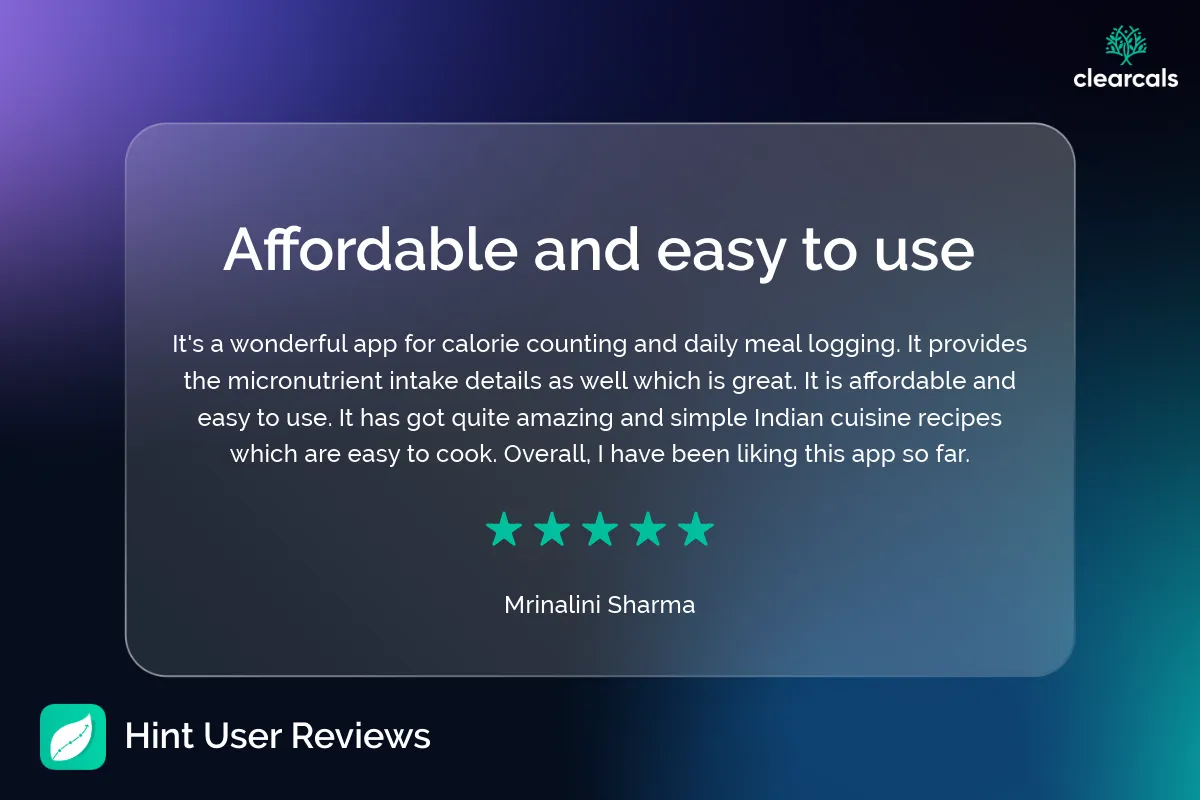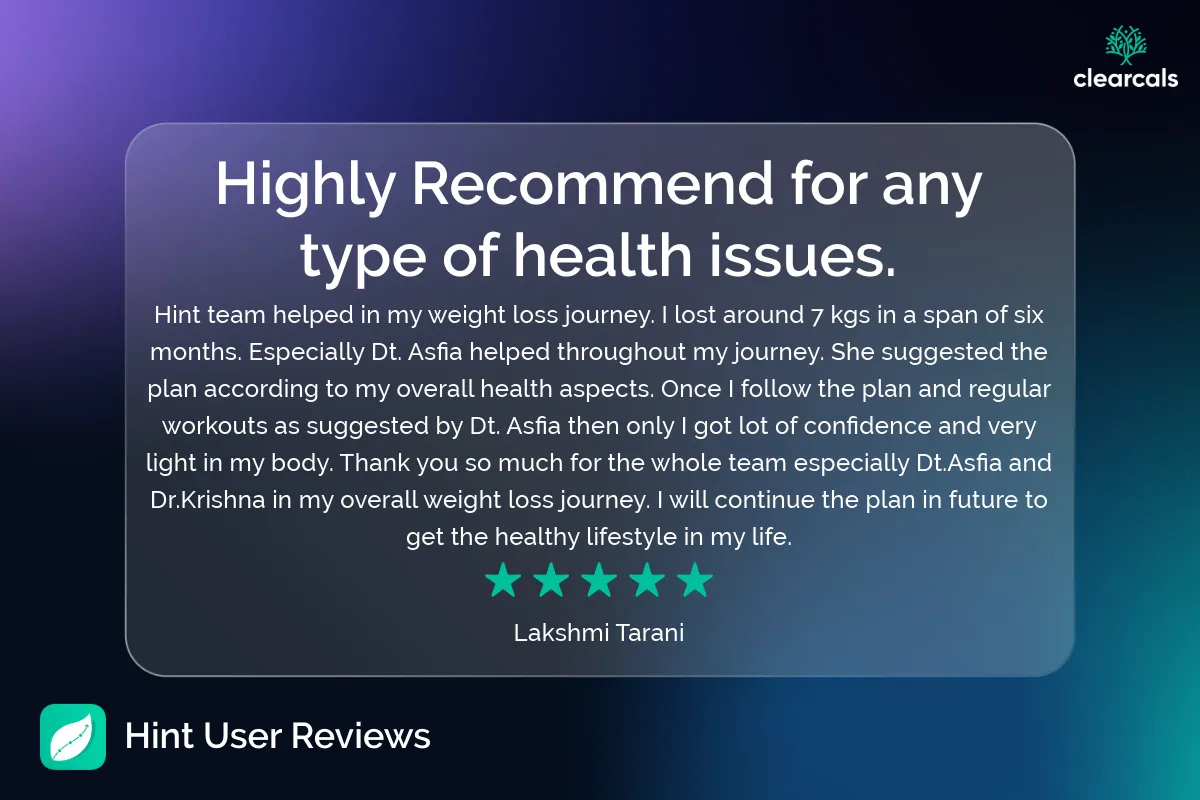Looking for a Personalized Diet Plan?
Anemia Diet Chart (Indian Iron-Rich Diet Plan)

Iron deficiency anemia is a common health concern in India, particularly among women, with over 50% affected by this condition.
If you’re looking for an easy way to address iron deficiency, boost energy, and improve overall health, the Hint app provides a comprehensive Anemia Diet Chart tailored specifically to your needs.
This personalized diet plan is rich in Indian foods that naturally contain high levels of iron, ensuring a culturally relevant approach to health and nutrition.
Additionally, the Hint app offers features like instant calorie and nutrient tracking and access to expert dietitian consultations through the Hint Pro and Hint Premium subscriptions.
Let’s explore the plan, key benefits, and how to subscribe to a personalized anemia diet chart.
TL;DR
- The Hint app offers a personalized Anemia Diet Chart designed to help recover from iron deficiency anemia, boost hemoglobin production, and improve energy and brain function.
- Below, you'll find essential tips, do's and don'ts, and information on how to subscribe.
- Please contact us if you have any questions that are not answered in the FAQs.
How to Subscribe to Hint Pro or Hint Premium for Your Anemia Diet Chart:
Download and Install the Hint App:
Search for "Hint" on the Apple App Store or Google Play Store, download, and install the app.
Create an Account or Log In:
Open the app, create an account, and provide your profile details, including age, gender, height, weight, and physical activity level, to personalize your Anemia Diet Chart.
Choose a Subscription Plan:
Select "Subscribe to Hint Pro" and pick a plan (monthly, quarterly, or yearly). With Hint Pro, you gain access to your personalized Anemia Diet Chart (Indian Iron-Rich Diet Plan) along with other health-focused plans.
For more support, opt for Hint Premium, which includes unlimited consultations with expert dietitians, personalized health plans, and advanced nutrient tracking.
Enter Payment Information and Confirm:
Complete the subscription process, and instantly gain access to your Anemia Diet Chart and other powerful features of Hint Pro or Hint Premium to support your health journey.

Why Follow an Anemia Diet Chart?
Anemia, particularly iron deficiency anemia, is a major health issue in India. Iron is essential for producing hemoglobin, which carries oxygen throughout the body. Insufficient iron can lead to fatigue, weakness, and reduced cognitive function.
The Hint Anemia Diet Chart (Indian Iron-Rich Diet Plan) helps address this problem by focusing on Indian foods rich in iron, such as lentils, spinach, and beans, and functional foods like garden cress seeds.
These ingredients help boost hemoglobin production, improve overall health, and prevent iron deficiency.
Key Benefits of the Hint Anemia Diet Chart
Increased Hemoglobin Production
The diet plan includes iron-rich foods like lentils, spinach, and dates, essential for boosting hemoglobin levels. Functional foods like wheatgrass powder and garden cress seeds further enhance iron absorption, making the plan effective for preventing and managing iron deficiency anemia.
Enhanced Energy Levels
Iron plays a key role in energy production by helping transport oxygen to cells. Following the Anemia Diet Chart can significantly improve your energy levels, reducing fatigue and helping you stay active throughout the day.
Better Brain Function
Iron is crucial for cognitive health, and the Anemia Diet Chart supports better brain function and memory by ensuring optimal iron intake.
Improved Immune System
The immune system relies on iron to produce white blood cells, which fight off infections. By following the Anemia Diet Chart, you can strengthen your immune system and lower your risk of illness.
6-Day Workout Plan
In addition to improving your iron intake, the Hint app offers a 6-day workout plan that complements your diet. This plan is designed for all fitness levels and can help improve stamina and overall fitness, even from home.
Instant Calorie and Nutrient Tracking
The Hint app makes it easy to track your daily intake of iron, vitamin C, and other nutrients through its instant calorie tracking feature. This ensures you stay on top of your nutrition and prevent deficiencies.
Plan Type
This is a monthly subscription plan. You can renew it every month, for three months, or once a year.
Diet Types Available
The Hint Anemia Diet Chart (Indian Iron-Rich Diet Plan) is available in three dietary preferences to suit different lifestyles:
Iron-rich vegetarian diet plan
Includes plant-based foods, dairy products, and iron-rich vegetables, ensuring optimal iron intake for vegetarians.
Iron-rich ovo-vegetarian diet plan
Combines vegetarian foods with eggs to provide a balanced iron intake, suitable for those who avoid meat but consume eggs.
Iron-rich non-vegetarian diet plan
Includes a variety of meat, fish, and poultry, along with regular vegetarian options, making it ideal for non-vegetarians aiming to boost their iron levels.
Do’s & Don'ts
Do’s & Don'ts for the Anemia Diet Chart:
Do’s:
- Start your day with a teaspoon of wheatgrass powder to boost iron levels.
- Include vitamin C-rich foods like citrus fruits to enhance iron absorption.
- Track your water intake using the Hint app to stay hydrated.
- Include dark leafy greens like spinach and fenugreek, rich in iron, in your meals.
- Stay active with at least 30 minutes of daily exercise.
Don'ts:
- Avoid consuming tea or coffee with meals, as they hinder iron absorption.
- Don’t pair iron-rich foods with calcium-rich dairy products, as this can reduce iron absorption.
- Avoid skipping meals and ensure a balanced diet for better nutrient absorption.
Tips to Maximize the Effectiveness of the Anemia Diet Chart
- Log your meals in the Hint app to track your iron intake and nutrient levels.
- Cook with cast iron cookware to increase the iron content in your food.
- Regularly consult with a dietitian through Hint Premium for personalized guidance on managing your anemia and overall health.

Frequently Asked Questions
1. What is anemia?
Anemia is a condition in which your body doesn’t have enough healthy red blood cells or hemoglobin to carry oxygen to your body’s tissues. This can result in fatigue, weakness, shortness of breath, and other symptoms.
2. What are the common causes of anemia?
The most common cause of anemia is iron deficiency, but it can also be caused by vitamin B12 or folate deficiency, chronic diseases, blood loss, or certain inherited conditions.
3. What is an Anemia Diet Chart?
An Anemia Diet Chart is a personalized meal plan designed to increase your iron intake and improve hemoglobin levels. It includes iron-rich foods and other nutrients that enhance iron absorption, helping to prevent and manage anemia.
4. What are some iron-rich vegetarian foods?
Iron-rich vegetarian foods include lentils, spinach, chickpeas, kidney beans, tofu, fortified cereals, pumpkin seeds, sesame seeds, and dried fruits like figs and apricots.
5. What are the best non-vegetarian sources of iron?
Non-vegetarian sources of iron include lean meats (beef, lamb), chicken, turkey, liver, fish (especially shellfish like clams, and oysters), and eggs.
6. What fruits are high in iron?
While fruits are generally not high in iron, dried fruits like prunes, raisins, apricots, and figs contain decent amounts of iron and can help manage anemia.
7. How can I improve iron absorption from my diet?
Pairing iron-rich foods with vitamin C-rich foods (such as citrus fruits, bell peppers, and tomatoes) can significantly enhance iron absorption. Avoid consuming tea, coffee, or calcium-rich foods with meals as they hinder iron absorption.
8. Can anemia be managed with diet alone?
For mild iron deficiency anemia, diet alone may help increase iron levels. However, more severe cases may require iron supplements in addition to following an Anemia Diet Chart. Always consult with your doctor for personalized advice.
9. How much iron do I need daily?
The recommended daily intake of iron is 19 mg for men and 29 mg for women, though this can vary depending on age, health conditions, and other factors.
10. What are the symptoms of iron deficiency anemia?
Common symptoms include fatigue, weakness, shortness of breath, dizziness, pale skin, headaches, cold hands and feet, and brittle nails.
11. Can I follow an Anemia Diet Chart if I have other dietary restrictions?
Yes, the Hint app offers personalized anemia diet charts based on your dietary preferences, including vegetarian, ovo-vegetarian, and non-vegetarian options. You can also tailor the plan to accommodate specific food allergies or restrictions with Hint Premium.
12. How long does it take to recover from anemia with a diet plan?
Recovery time depends on the severity of the anemia and your adherence to the Anemia Diet Chart. For mild cases, improvement can be seen within a few weeks, while more severe cases may take several months.
It’s important to follow up with regular blood tests and consultations with a healthcare professional.
13. Is the Hint Anemia Diet Chart only for people with anemia?
While the Anemia Diet Chart is designed to help those with iron deficiency anemia, it can also benefit anyone looking to maintain healthy iron levels and improve overall energy, brain function, and immune health.
14. Does the Anemia Diet Chart include supplements?
The diet plan primarily focuses on whole foods rich in iron. However, if your doctor or dietitian recommends iron supplements, the plan can be adjusted to include them.
15. Can I track my iron intake using the Hint app?
Yes, the Hint app allows you to track your daily intake of iron, vitamin C, B vitamins, and other nutrients, ensuring that you meet your dietary goals and improve your health.
16. How does the Hint app help in managing anemia?
The Hint app provides a personalized Anemia Diet Chart tailored to your dietary preferences and health goals. It also includes instant calorie and nutrient tracking, a 6-day workout plan, and access to dietitian consultations through Hint Pro and Hint Premium subscriptions for expert guidance.
Final Thoughts
Iron deficiency anemia is a widespread issue in India, but it can be effectively managed through the right diet. The Hint Anemia Diet Chart (Indian Iron-Rich Diet Plan) offers a tailored solution designed to improve your iron intake and overall health, with the added convenience of tracking your progress through the Hint app.
For personalized guidance and ongoing support, the Hint Pro and Hint Premium subscriptions give you access to expert dietitians, tailored diet plans, and powerful features like calorie and nutrient tracking. Start your journey toward better health today with the Hint Anemia Diet Chart.
For more tips, do's and don'ts, and frequently asked questions, refer to the sections above and start making changes to your diet that will lead to lasting improvements in your health.





